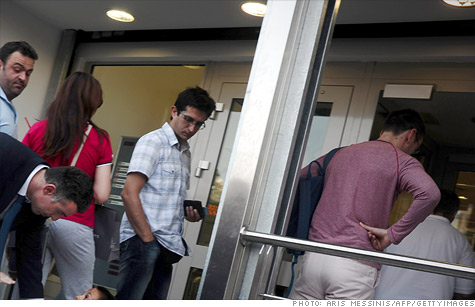Search News

Bank customers in Greece, lining up recently at an ATM, have made widespread withdrawals of cash.
NEW YORK (CNNMoney) -- The Greek financial system is straining hard for cash.
Consumers and businesses are making massive withdrawals from Greece's banks -- leading to concern the beleaguered nation could be forced out of the eurozone by a banking crisis even before its government runs out of cash.
Deposits are the lifeblood of any bank, and Greeks pulled 800 million euros out of the banking system on Tuesday alone, the most recent day for which figures are available.
At the same time, the European Central Bank this week cut back -- at least temporarily -- on how much it was willing to lend to some Greek banks. (Greece downgraded deeper into junk territory)
The central bank, whose loans have provided banks with much-needed cash, said it believed the loan freeze would last only a few days until the banks secure already-approved European bailout funds.
But the freeze has forced banks to instead borrow from the Greek National Bank -- at higher interest rates.
Two factors are driving the banks' problems: Greek customers are worried their money isn't safe. And they are concerned that their euros will be worth much less if Greece leaves the eurozone and institutes a new lower value national currency, the drachma.
"There's a lot to be gained from keeping your wealth in euros and transferring them to drachmas after the conversion," said Jonathan Loynes, chief European economist for Capital Economics.
And no banking system, no matter how strong, can survive massive and prolonged withdrawals of deposits, said Kris Niswander, associate director of European financial institutions for SNL Financial.
"If you have significant deposit withdrawals, that's difficult for any institution to overcome no matter the macroeconomic factors. Of course that's not even taking into account everything going on in Greece," Niswander said.
Deposits in Greek banks have been falling fairly steadily since the end of 2009, but the pace of withdrawals has since accelerated. In March, deposits were down nearly 20% from a year earlier.
Much of that decline was probably caused by consumers, who had lost their jobs or suffered deep pay cuts, taking out money to pay their bills.
The pace of withdrawals has likely quickened since a May 6 vote raised the possibility of a Greek exit from the eurozone, experts said. The country is now being run by a caretaker government. It is believed Greece could be forced out of the eurozone if a European bailout deal collapses after the next vote on June 17.
Loynes of Capital Economics wrote a report last year suggesting that a massive run on a nation's banking system might be the tipping point that forced one of the 17 member nations out of the eurozone, rather than a default on government debt.
Government debt defaults can be dealt with -- or at least delayed -- with bailouts or debt restructuring, as European leaders have done repeatedly over the last year.
But runs on the banks are far more difficult to stop or reverse, said Loynes. And the potential costs of propping-up a troubled banking system like Greece's could be too great for the other European countries to accept, even if their leaders voice support for keeping Greece in the eurozone.
"It depends how long the rest of Europe is willing to give the Greek banking system support," he said. "It is not clear that the rest of the eurozone will tolerate the situation for very long." ![]()
| Overnight Avg Rate | Latest | Change | Last Week |
|---|---|---|---|
| 30 yr fixed | 3.80% | 3.88% | |
| 15 yr fixed | 3.20% | 3.23% | |
| 5/1 ARM | 3.84% | 3.88% | |
| 30 yr refi | 3.82% | 3.93% | |
| 15 yr refi | 3.20% | 3.23% |
Today's featured rates:
| Latest Report | Next Update |
|---|---|
| Home prices | Aug 28 |
| Consumer confidence | Aug 28 |
| GDP | Aug 29 |
| Manufacturing (ISM) | Sept 4 |
| Jobs | Sept 7 |
| Inflation (CPI) | Sept 14 |
| Retail sales | Sept 14 |